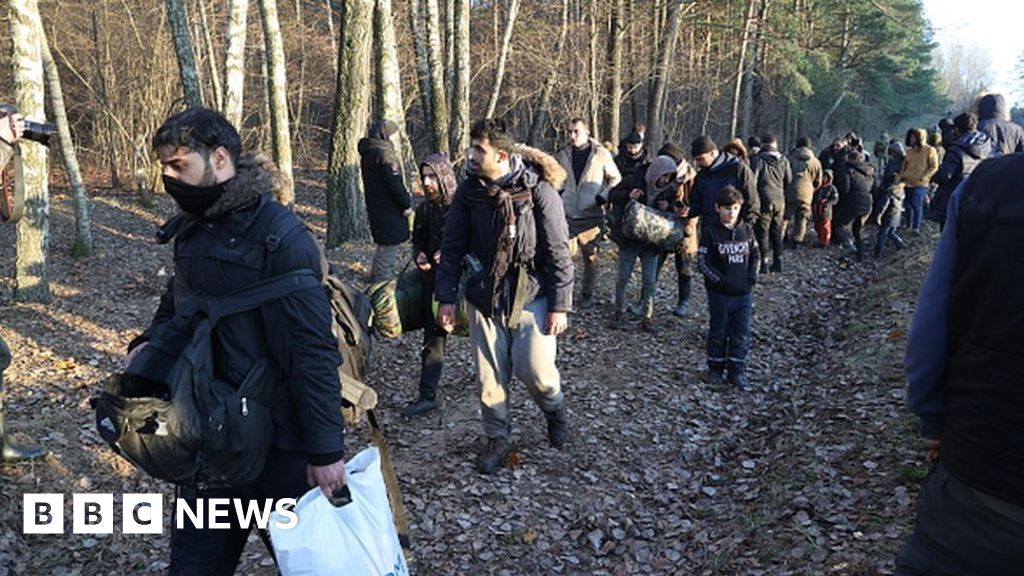- By Paul Adams and Joshua Nevett
- BBC News
Image source, Getty Images
“I swear to God, guys, gathering is the best thing.”
With winter approaching and frustrations rising in the forests of western Belarus, the word went out among thousands of desperate would-be migrants.
The best way to get to Poland, the messages said, was to try going en masse, rather than in furtive groups, creeping through the forest, hoping to cross into the European Union (EU) unnoticed.
“All immigrants go to this site,” the messages said, complete with images of the Azs-16 Belorusneft petrol station, just over 1.6km (one mile) from the border.
And so, last Monday, thousands of migrants converged on the petrol station close to the Belarusian village of Bruzgi and started walking to the nearby border. Their target area was a crossing at Kuznica, where they believed they could enter Poland, hopefully unimpeded.
Image source, Telegram screen shot
The crowd was mostly made up of Iraqi Kurds, escaping political and economic hardships at home in the hope of finding better lives in the EU.
Videos from Monday show Belarusian soldiers standing by, unwilling or unable to stop the crowd reaching the border.
The country’s authoritarian leader, Alexander Lukashenko, stands accused by the EU of orchestrating this entire crisis, which has been building since the summer.
His neighbours call it a form of “hybrid warfare” against the EU, waged in revenge for successive waves of sanctions against his repressive regime.
It’s a charge he denies, despite warning, back in May, that he would no longer attempt to stop migrants and drugs passing into Europe.
But while there is now ample evidence that the Lukashenko regime has encouraged tens of thousands of migrants to fly to Minsk and then pointed them in the direction of the borders with Lithuania and Poland, it’s clear that social media is playing a significant role in shaping the actions of the migrants.
Image source, Telegram screen shot
On Monday, Poland accused Belarus of sending a large group of migrants to breach the border, calling it a major provocation. But it appears the mass move to a single crossing point may have been orchestrated by the migrants themselves, not the Belarusian authorities.
Over a period of several days from late last week, Kurdish Telegram and Facebook groups with thousands of members were full of messages, telling migrants to head for a single location, with a specific purpose in mind.
“The convoy of hope stands here on the map, marked with a red balloon,” read one message, repeated several times in a group called Iraqi Immigrants.
“Tomorrow at 9:30 behind the station all be ready for a few hours then leave,” read another. “Please join. It’s the only solution.”
Image source, Facebook screen shot
Migrants and family members contacted by the BBC say that the convoy consisted of some who travelled directly from the Belarusian capital, Minsk, but also large numbers who had been trapped in the nearby forest for days, unable to find a way across the border.
Shwan Kurd, a 33-year-old from Iraq, was among those who were already in the forest. He witnessed Monday’s rush to the border but didn’t know if it was planned.
“Everyone came to one place,” he said. “Maybe people came because of the social media posts.”
A large crowd, they reckoned, would be impossible to ignore.
“For those in Belarus,” another Telegram message read, “thousands of people have gathered to create a mass influx.”
Image source, Telegram screen shot
The migrants have an eye on past precedent.
“The refugees said ‘let’s repeat 2015’,” Barwa Nusreddine Ahmed told me from his home in the northern Iraqi city of Sulaymaniyah. From there, he’s closely following the progress of his brother, who’s travelling with his pregnant wife and three children.
In 2015-16, hundreds of thousands of migrants poured into Europe from Turkey, triggering a major crisis. There were dramatic scenes as desperate people pushed their way through the Greek-Macedonian border.
The German chancellor, Angela Merkel’s decision to open Germany’s doors contributed to the stampede and won the fierce admiration of migrants. The gesture has not been forgotten, and those flooding into Belarus this year hope, even believe, that the gesture will be repeated.
“They said we must do that thing again, so the world will see us,” Mr Ahmed said.
“The refugees say… we want to show the world how many people we are. Everybody is waiting for Germany to take action.”
But the historical parallels don’t stop there.
Image source, Getty Images
The Kurds, as a stateless and frequently persecuted people, have not failed to notice that 2021 marks a grim anniversary.
In 1991, 1.5 million Kurds fled Iraq into neighbouring countries as former President Saddam Hussein sought to punish them for rising up in the wake of that year’s Gulf War. It was an epic, harrowing struggle, as desperate refugees fled through the mountains in appalling conditions.
In recent days, social media posts have noted the 30th anniversary of this traumatic event, and made explicit parallels with what is happening now.
“It’s not something new to the Kurds,” Mr Ahmed said.

